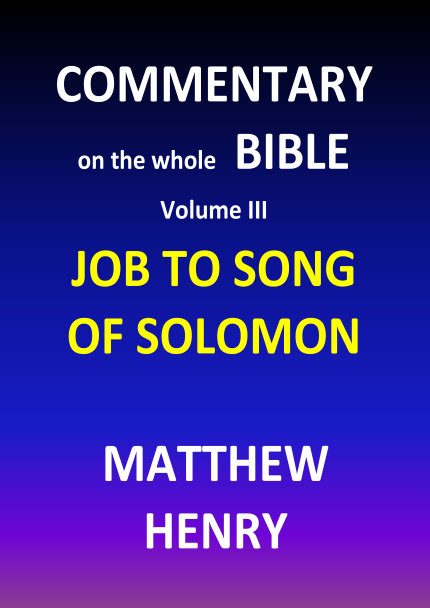Matthew Henry

Commentary on the Whole Bible.
Volume III – Job to Song of Solomon.
By Matthew Henry.
About Matthew Henry work on the Commentary:
The Complete Commentary, also known as Henry’s well-known six-volume Exposition of the Old and New Testaments (1708-1710), provides a comprehensive analysis of the Bible, covering the entire Old Testament and the Gospels and Acts in the New Testament.
After Henry’s death, thirteen other non-conformist ministers completed the sixth volume of Romans through Revelation using notes taken by Henry’s hearers. The Commentary was re-edited in 1811 by George Burder and John Hughes.
Henry’s commentaries are primarily theological and aim to provide practical and devotional explanations of each chapter of Scripture. He recommends Matthew Poole’s Synopsis Criticorum for a more technical analysis.
The Commentary was highly regarded by famous evangelical Protestant preachers, including George Whitefield and Charles Spurgeon. Whitefield read it four times, the last time on his knees, while Spurgeon recommended that every minister should read it entirely and carefully at least once. John Wesley published an abbreviated edition of the Commentary and praised Henry’s strong understanding, solid piety, and deep, practical analysis of the Scriptures.
Several abbreviated editions of the Commentary were published in the twentieth century, and Martin H. Manser edited The New Matthew Henry Commentary, which updates the language of the classic work.
About the Bible books covered in third volume of the Commentary:
Job: The book of Job is an exploration of the problem of evil and suffering. It tells the story of a man named Job who is afflicted with great suffering and questions why God would allow this to happen. The book wrestles with the question of why bad things happen to good people and ultimately affirms God’s sovereignty and goodness.
Psalms: The book of Psalms is a collection of 150 poems and songs, many of which were written by King David. The psalms cover a wide range of emotions, from joy and praise to lament and despair.
Proverbs: The book of Proverbs is a collection of wisdom sayings and teachings attributed to King Solomon and other wise men. The proverbs offer practical advice on how to live a wise and righteous life, covering topics such as work, money, relationships, and speech.
Ecclesiastes: Ecclesiastes is a philosophical reflection on the meaning of life. The author, often assumed to be King Solomon, explores the vanity of earthly pursuits and the ultimate futility of human striving. The book ultimately affirms that true meaning and purpose can only be found in a relationship with God.
Song of Solomon: The Song of Solomon is a love poem that celebrates the joys of romantic love and sexual intimacy. The poem features a dialogue between a man and a woman who express their love for each other in poetic language. The book is interpreted both literally as a celebration of human love and metaphorically as an allegory for the love between God and his people.